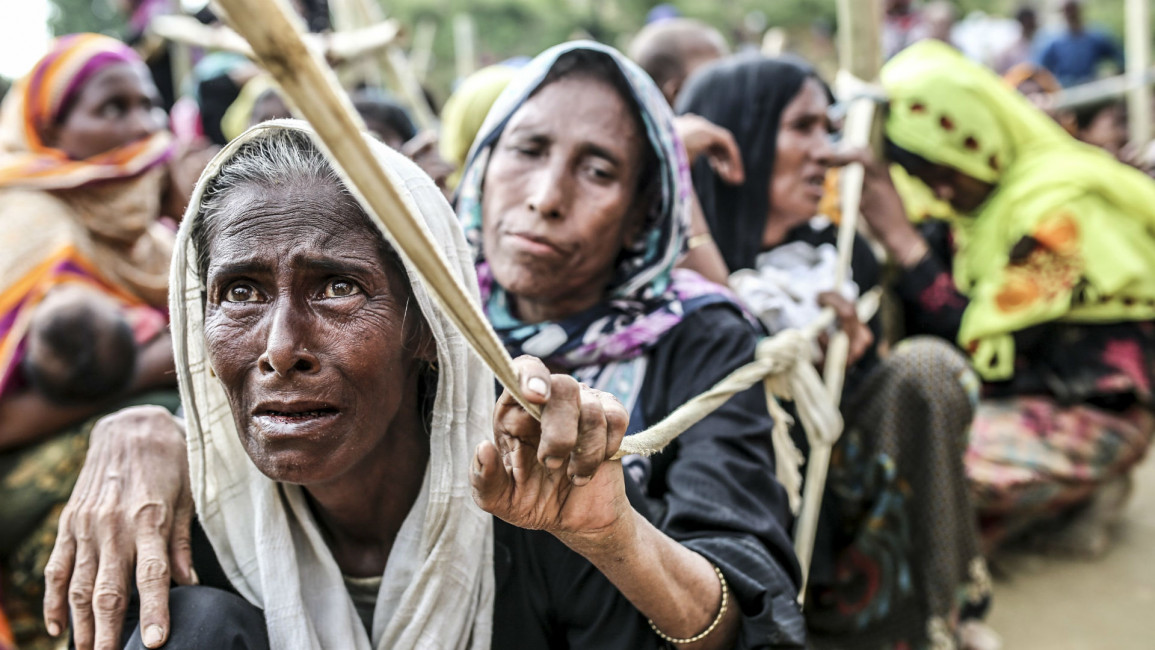UN visit to Myanmar's Rakhine state thwarted by 'bad weather'
The UN said it had been told its representatives could join a government-steered trip to the area on Thursday - but the visit did not take place.
"The government-organised visit was postponed to next week because of weather conditions," a spokesman from the Office of the UN Resident Coordinator in Myanmar said, without giving further details.
The United Nations has urged Myanmar to allow humanitarian access to northern parts of Rakhine state since violence erupted in late August, forcing around 500,000 Rohingya Muslims to flee.
The UN Security Council is due to meet on the crisis later on Thursday.
"There will be a trip organised by the government, probably tomorrow, to Rakhine," UN spokesman Stephane Dujarric said earlier.
"We hope above all that it is a first step toward much freer and wider access to the area," he said at his daily news briefing, noting chiefs of UN agencies would take part in the trip.
The UN has drawn up a contingency plan to feed up to 700,000 Rohingya refugees from Myanmar, and warned that those who fled will not be returning home soon.
"All the UN agencies together have now set a plan for a new influx of 700,000. We can cover if the new influx reaches 700,000," the World Food Program's deputy chief in Bangladesh, Dipayan Bhattacharyya, said on Wednesday.
'Return will take time'
UN refugee agency chief, Filippo Grandi said that for those who have fled to Bangladesh, "return will take time, if it happens, if the violence stops."
Last week, Rohingya community leaders said most of the Rakhine villages near the Bangladesh border are now deserted.
"Almost all the people I know have arrived in Bangladesh," Yusuf Majihi, a Rohingya leader at a camp at Balukhali, near Cox's Bazar, told AFP.
"Village after village has become empty due to the attacks by Myanmar soldiers and torching of the houses by Moghs (Buddhists)," he added.
"Those who are left in Rakhine live far off the border," he said.
According to government figures, nearly 40 percent of Rohingya villages in northern Rakhine have been abandoned over the past month.
The United Nations estimates more than 1,000 people may already have been killed in Myanmar, mostly minority Rohingya Muslims - more than twice the government's total.
The Rohingya have long been subjected to discrimination in mostly Buddhist Myanmar, which regards them as illegal immigrants from Bangladesh and denies them citizenship even if they have lived in the country for generations.
Myanmar's military, under fire for imposing a news blackout on the campaign around the city of Maungdaw in the country's west, on Wednesday organised a press tour in the Hindu village of Ye Baw Kyaw.
Mass graves containing 45 Hindu villagers were discovered in the area earlier this week, and the military has accused Rohingya militants of carrying out the massacre.
But the Arakan Rohingya Salvation Army (ARSA) "categorically" denied that its members "perpetrated murder, sexual violence, or forcible recruitment" in the area.
The decomposing skeletal bodies remained laid out in rows on a grassy field outside Ye Baw Kyaw as distraught relatives wailed, according to AFP journalists at the scene.
Myanmar's army has tried to control the narrative over the crisis, restricting press access to the conflict zone while it posts regular updates that blame Rohingya militants for the bloodshed.
Government and military reports have also sought to highlight the suffering of other ethnic groups, such as Rakhine Buddhists and Hindus, swept up in the communal unrest.
Ethnic cleansing accusations
The latest violence has intensified long-running religious hatreds and been complicated by a swirl of rival narratives from different ethnic groups.
Thursday's visit for the UN representatives will come on the same day that the UN Security Council meets on the situation in Myanmar.
On September 13, the council demanded "immediate steps" to end the Myanmar violence and expressed concern about "excessive force" being used by the military.
The council also called on the Myanmar government to abide by its commitment to facilitate humanitarian aid in Rakhine, but until now that request has not been met.
Secretary General Antonio Guterres will address the UN Security Council during its open door session. As a former UN high commissioner on refugees, Guterres knows Rakhine and the context of the current crisis intimately.
With accusations of "ethnic cleansing" being levelled at the UN General Assembly, Myanmar leader Aung San Suu Kyi said last week she was "ready" to organise the return of the Rohingyas.
The Rohingyas, the world's largest stateless group, are treated as foreigners in Myanmar, whose population is 90 percent Buddhist.
Agencies contributed to this report.



